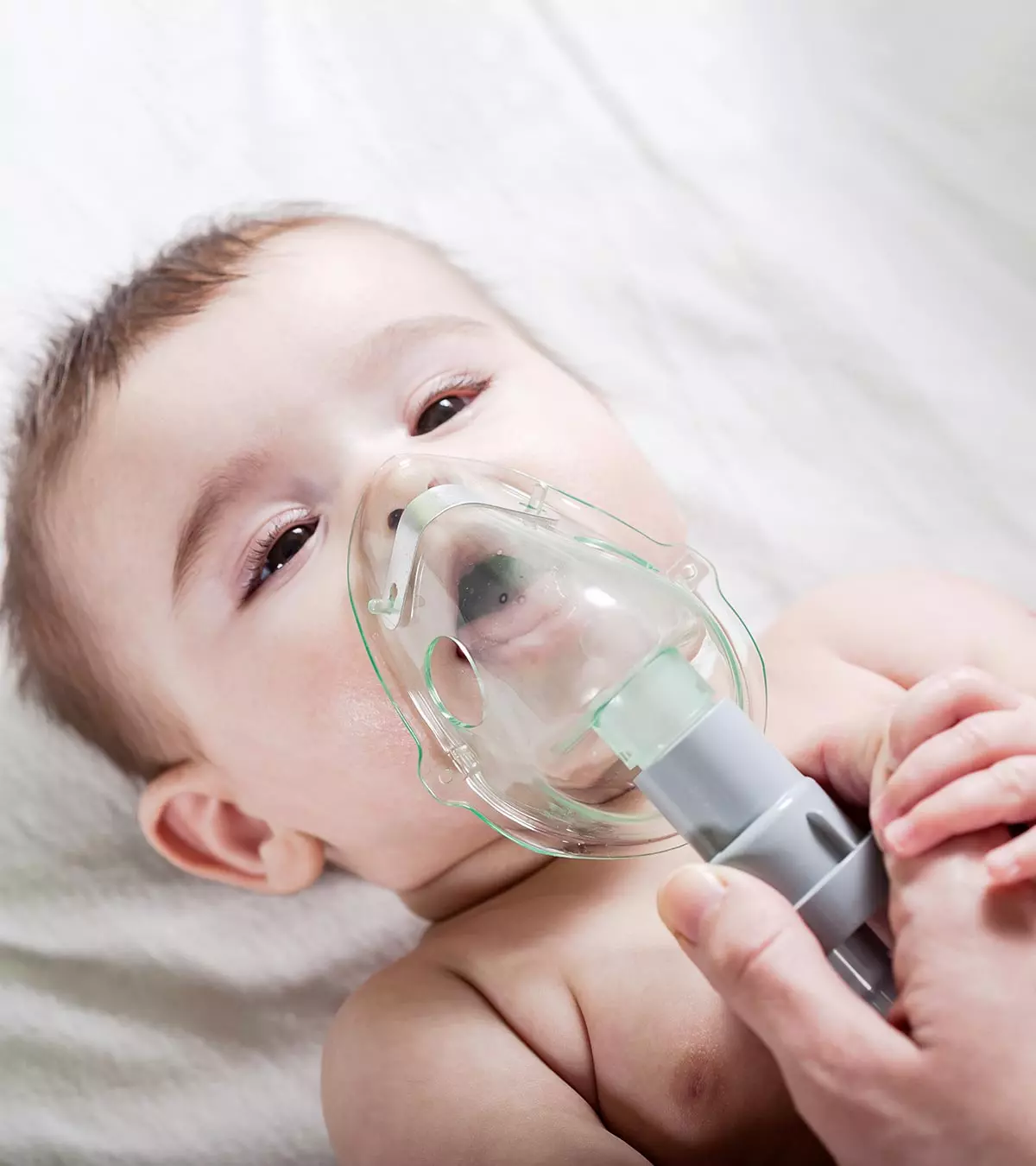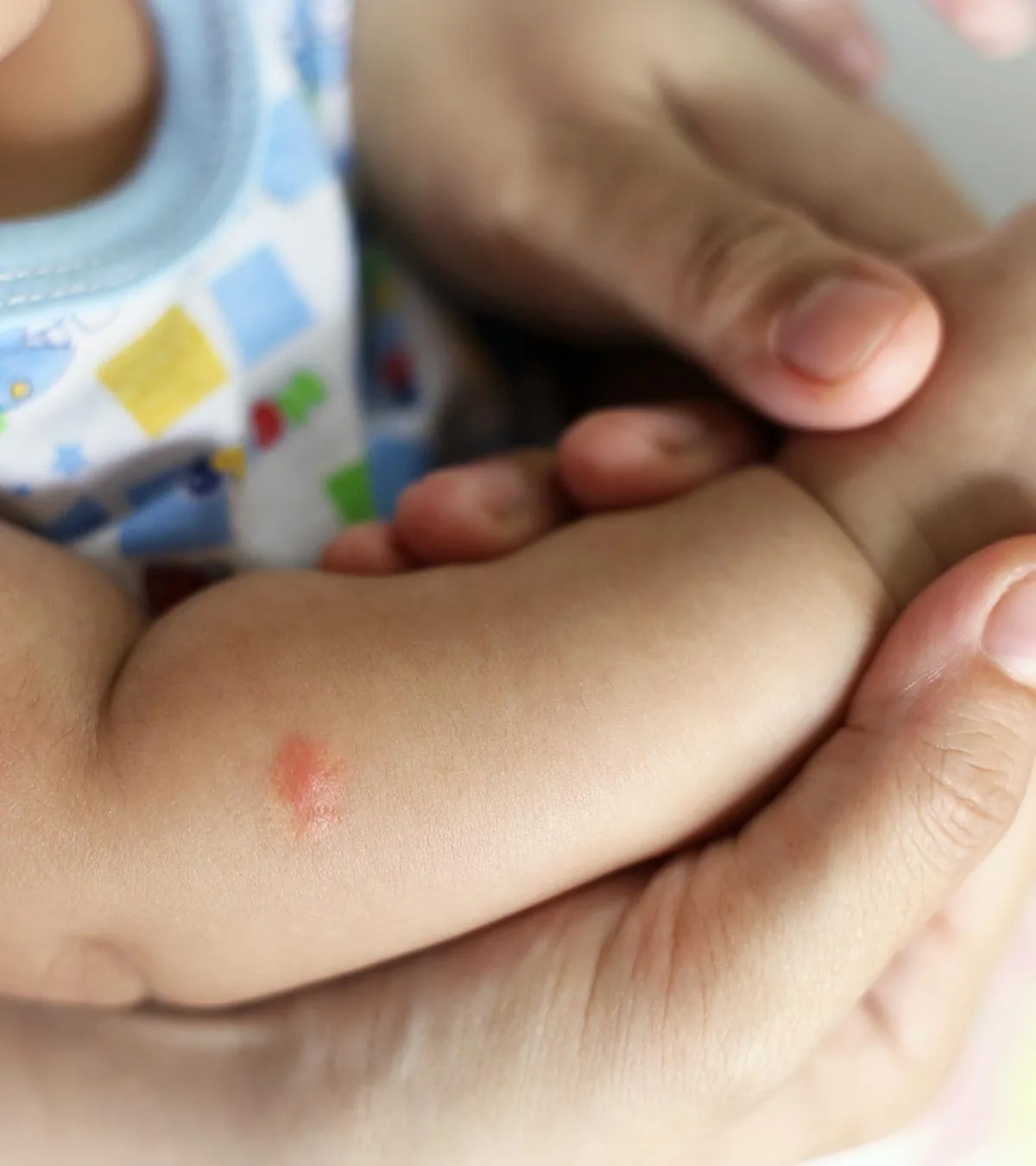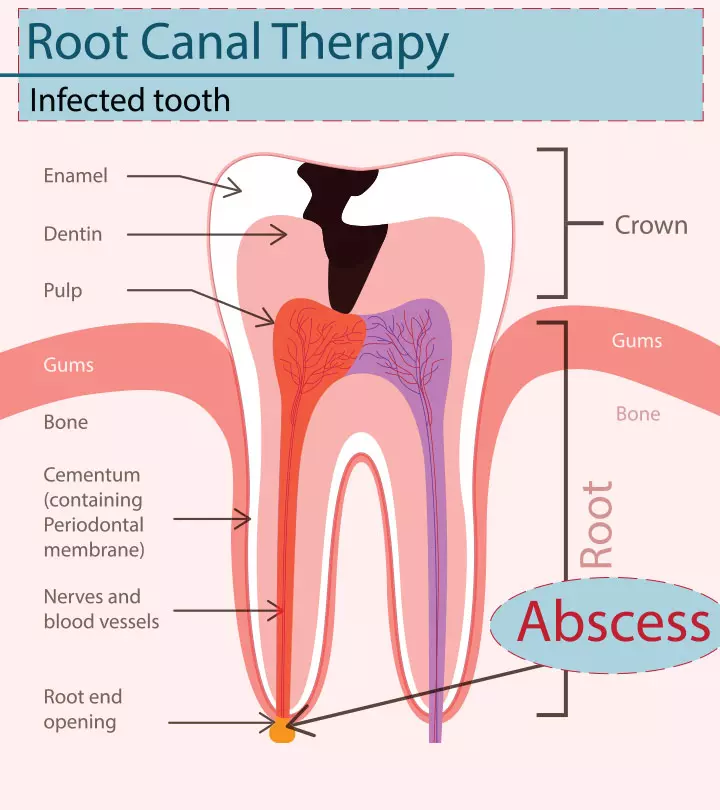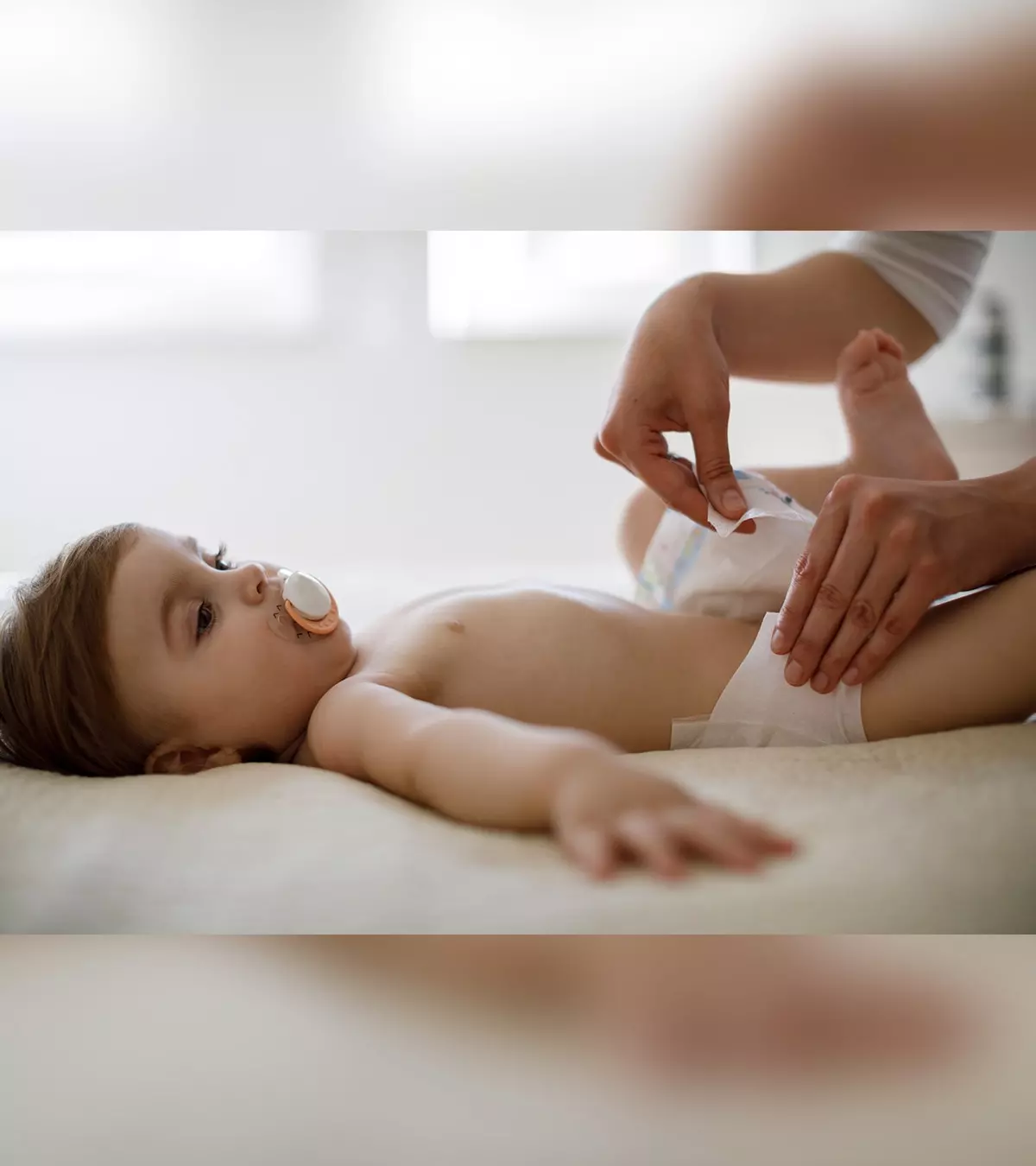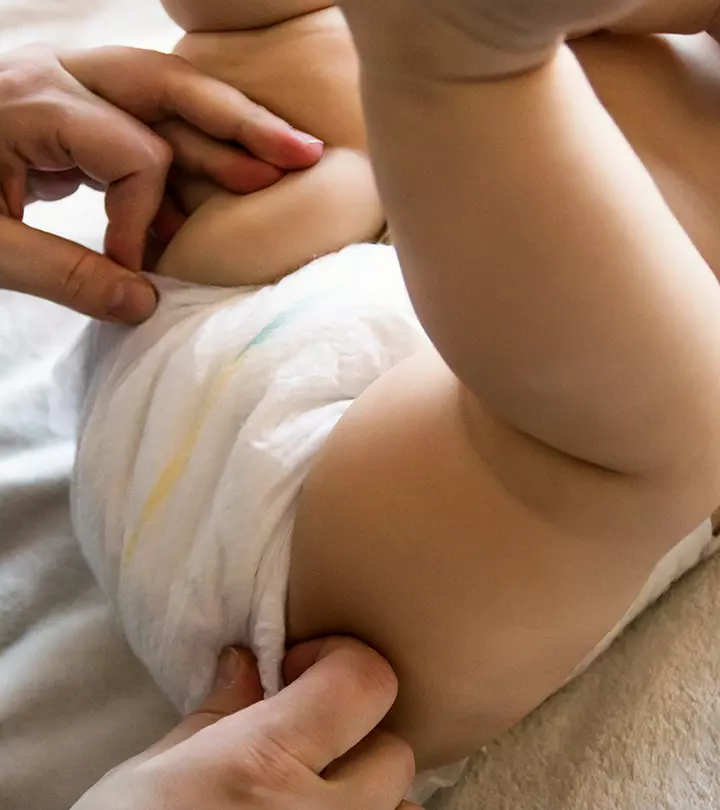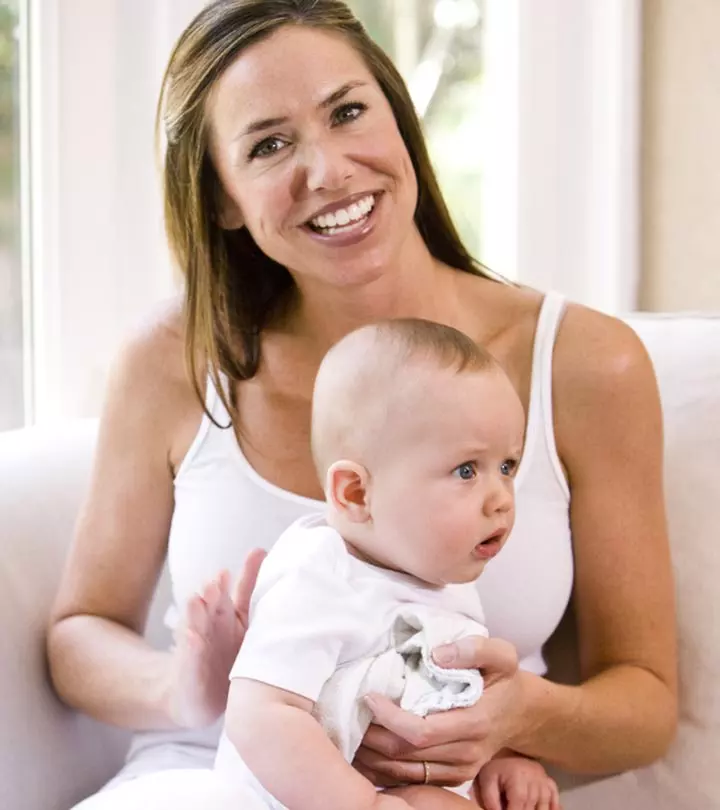
Image: Shutterstock
When do you stop burping a baby? New parents may often wonder about it. Burping is a part of your baby’s feeding regimen to assist your baby to release the excess gas from the tummy that they tend to ingest while feeding (1). It is believed to assist your child to avoid spitting up and relieving gastrointestinal discomfort, such as colic, caused by trapped gas.

Read on to learn more about when to stop burping a baby, indications to watch for to make an informed decision, and other alternative ways of help.
Key Pointers
- Most newborns do not require burping after four to six months
- For some babies, the gastrointestinal system matures by six months, and they do not require burping.
- Breastfed babies need less burping than bottle-fed babies, and quit burping sooner.
- If your baby continues to show signs of trapped air despite burping, move their legs in a bicycling motion to release air.
When Can You Stop Burping The Baby?
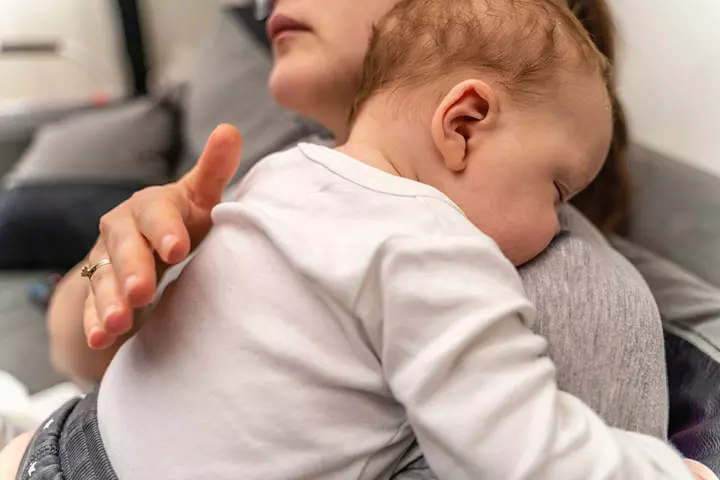
Most infants usually do not need burping by the age of four to six months (2). However, every baby is different, and so is the rate at which their gastrointestinal system matures. As a result, burping frequency may be more for some babies, while some may not require burping at all.
Since there is variation in the need for burping babies, a set age to stop burping doesn’t fit all babies. Hence, identifying signs indicating your baby may be ready to go off burping is necessary.
 Quick fact
Quick factSigns You Can Stop Burping The Baby
Here are some baby body cues and their meanings to help you figure out if you can stop burping your baby.
- Babies can sit up and move: Most babies can control their head and neck and sit without support around six months of age. Around the same time, they may also begin crawling and move around a bit (3)(4). Additionally, their gastrointestinal system is relatively more mature now and can hold up gastric content more efficiently, meaning they might have fewer spit-ups and passed the burping age, requiring no burping at all.

- Baby is burping themselves: There may be instances when your baby will suddenly pull away from you while feeding and burp without you rubbing their back. A baby burping independently is a strong determinant, indicating that you don’t need to burp them anymore. According to experts, most babies can readily burp on their own by two months of age (5). However, some babies may take longer. So, observe your baby. If they appear unsettled or fussy during and after feeding, they might need you to burp them.
- Baby looks comfortable during and after feeding: Experts recommend burping babies when they look uncomfortable during feeding (6). However, if the baby looks comfortable during feeding and is happy and playful right after feeding, you may start weaning from burping.
- Baby is bottle-fed or breastfed: Both bottle-fed and breastfed babies can suck air while feeding. However, bottle-fed babies tend to suck more air because the milk flows faster from a bottle than it does from the mother’s breast (7). Hence, breastfed babies require less burping than bottle-fed babies, and they may as well sooner call it quits (8).

Most experts recommend burping babies to reduce spit-ups and prevent gastrointestinal gas buildup that causes issues, such as colic. However, some studies have concluded that burping does not significantly lower colic events and spit-ups (9). Therefore, consult your pediatrician to know whether the baby needs burping or not. If the doctor says yes, follow their directions to burp the baby.
What To Do If Burping Doesn’t Help?
Try different burping techniques or the following alternatives if your baby continues to show signs of trapped air, such as squirming, despite burping.
- Move baby’s legs in bicycling motion: Lay your baby on their back on a flat surface. Then, gently hold their ankles and move them as if the baby is pedaling a bike. Moving the baby’s legs this way strengthens abdominal muscles and causes the trapped air to pass through (10)(11).
- Do tummy massage: Experts suggest that massaging the baby’s tummy can help pass trapped gas and belch (6). Lay your baby on its back on a smooth surface. Then, rub their tummy in a circular motion. It helps move the gas in the digestive tract and push it out of the baby’s system. After talking to your healthcare provider, you can use essential oil, lotion, or massage oil for the baby massage.

- Replace the formula: Some babies can be sensitive to a specific formula type, causing them to experience colic and restlessness (12). If your formula-fed baby behaves so after feeding, discuss changing formula with your pediatrician. The doctor will evaluate your baby’s signs and symptoms and suggest a suitable alternative for your baby.
- Change the bottle nipples: Bottle-fed babies get gassy when they swallow excess air or air bubbles. It can happen due to several reasons, such as big holes in the nipple. Consider changing it if you suspect your baby’s discomfort after feeding is associated with a nipple issue. You can consult a pediatrician or lactation consultant to know the appropriate nipple size and type for your baby.
- Change the bottle: Several brands have developed anti-colic bottles that claim to reduce the air that bottle-fed babies tend to swallow. However, no specific bottle has been found effective against colic. Nevertheless, you can consult your pediatrician and discuss trying bottles, such as a self-pacing bottle that regulates the suck-swallow-breath coordination. Such bottles reduce the amount of air that the bottle-fed babies swallow and may decline the need for burping (13).
- Home remedies and OTC medications: You may try some home remedies, such as colic drops, roll-ons, or gripe water for babies, after talking to your healthcare provider. Several over-the-counter (OTC) medications may also help the baby pass trapped air. However, consult a doctor before providing any medicine to the baby.
 Quick tip
Quick tip
In some cases, burping a baby doesn’t work because the problem isn’t trapped gas, but a gastrointestinal issue, such as GERD or acid reflux in babies. If your baby is burping excessively, the burping is accompanied by other problems, such as excessive spit-up or projectile vomiting, it would be best to consult your pediatrician. The doctor will note your little one’s symptoms and do an evaluation to determine the underlying cause.
Frequently Asked Questions
1. Is it alright to put my baby to sleep without burping?
If you have tried multiple times but failed to burp your little ones before putting them to bed, you do not have to keep trying for longer. However, if your baby wakes up in the middle of the night due to gas, pick them up, burp them, and put them back to sleep again (14)
2. Can a baby choke in sleep if not burped?
If you are concerned that your baby could vomit or choke since they did not burp before sleeping, do not worry since babies have a reflex that helps them spit or cough up any fluid that obstructs their airways. Furthermore, no evidence shows that babies might choke after feeding or sleeping on their backs (15).
3. Do you burp after dream feed?
Burping after a dream feed isn’t essential for every baby. Some babies, particularly those who are calm and don’t ingest much air, may not require burping. Yet, if your baby experiences gas or colic, you can attempt gentle techniques like rubbing or patting to relieve trapped air. If needed, burping can be performed, even if it might disturb sleep (17).
4. Is it harmful to stop burping a baby too soon?
No, not burping a baby does not cause harm or stomach issues. Studies indicate that burping or not burping a baby has no impact on colic symptoms and may actually increase spit-up. Babies naturally release gas through burping or passing gas. Hence, parents need not fret if their baby doesn’t burp or if they opt not to burp them. It is advisable to consult a pediatrician regarding any concerns about the baby’s digestion (18).
5. Do breastfed babies need to be burped as often as formula-fed babies?
Breastfed infants generally need fewer burps than formula-fed ones, as per the American Academy of Pediatrics. This is because breastfeeding involves a slower milk intake. Bottle-fed babies gulp air more as they consume milk faster than breastfed babies (19).
Helping a baby burp after every feed and between feeds aids reduce stomach discomfort. The development of the gastrointestinal system decides when you stop burping the baby. It takes nearly four to six months for the digestive system to grow to the stage when you don’t need to burp the infant. Some newborns, though, may take longer. After feedings, look for signs such as the baby becoming playful or burping themselves. If your baby isn’t burping, don’t fret; but see a doctor if they appear unhappy after feeding or spit up excessively.
Infographic: What If Burping The Baby Always Ends In Spit-Up?
Burping can lead to spit-up in babies. It is normal until the baby’s esophageal sphincter is not fully developed. However, spitting up more frequently, even after simple measures, may require pediatric evaluation to exclude gastroesophageal reflux in babies. Go through the infographic to know what to do if your baby spits up while burping.
Some thing wrong with infographic shortcode. please verify shortcode syntax
Illustration: When Do You Stop Burping A Baby?

Image: Dall·E/MomJunction Design Team
Get valuable expert advice on the optimal timing to stop burping your baby, facilitating a seamless transition to independence.
References
- Baby basics: How to burp your baby.
https://www.unicef.org/parenting/child-care/how-to-burp-baby - Baby Burping.
https://www.boystownpediatrics.org/knowledge-center/baby-burping - Infant Nutrition and Feeding.
https://www.healthychildren.org/English/ages-stages/baby/Pages/Movement-4-to-7-Months.aspx - Milestone Checklist.
https://helpmegrowmn.org/HMG/HelpfulRes/Articles/BabyMilestones/index.html - Burping a Baby.
https://wa.kaiserpermanente.org/kbase/topic.jhtml?docId=not42086 - How to breastfeed.
https://www.nhs.uk/start-for-life/baby/feeding-your-baby/breastfeeding/ - Gastrointestinal Problems.
https://www.stanfordchildrens.org/en/topic/default?id=gastrointestinal-problems-90-P02216 - UA Matters: Tips for Getting Babies to Burp.
https://news.ua.edu/2015/04/ua-matters-tips-for-getting-babies-to-burp/ - R Kaur et al. A randomized controlled trial of burping for the prevention of colic and regurgitation in healthy infants.
https://pubmed.ncbi.nlm.nih.gov/24910161/# - Why Is My Baby So Gassy?
https://rmccares.org/2025/09/08/why-is-my-baby-so-gassy/ - Breaking Up Gas.
https://www.healthychildren.org/English/ages-stages/baby/diapers-clothing/Pages/Breaking-Up-Gas.aspx - Infant Formula.
https://familydoctor.org/infant-formula/ - Chantal Lau; (2025); To Individualize the Management Care of High-Risk Infants With Oral Feeding Challenges: What Do We Know? What Can We Do?
https://www.ncbi.nlm.nih.gov/pmc/articles/PMC7297031/ - Burping Your Baby.
https://kidshealth.org/en/parents/burping.html - Myths and Facts About SIDS and Safe Infant Sleep.
https://safetosleep.nichd.nih.gov/reduce-risk/FAQ - How to Burp Baby—and Why They Need to Burp
https://pathways.org/how-to-burp-baby-and-why/ - What Is Dream Feeding and How It Helps Your Baby Sleep?
https://www.sleepadvisor.org/dream-feeding/ - Debunking Old Wives’ Tales: Do Babies Need to Burp After Feeding?
https://healthcare.utah.edu/the-scope/kids-zone/all/2025/06/debunking-old-wives-tales-do-babies-need-burp-after-feeding - UA Matters: Tips for Getting Babies to Burp
https://news.ua.edu/2015/04/ua-matters-tips-for-getting-babies-to-burp/
Community Experiences
Join the conversation and become a part of our nurturing community! Share your stories, experiences, and insights to connect with fellow parents.
Read full bio of Maria Carmela Villania-Mamauag
Read full bio of Swati Patwal
Read full bio of Rohit Garoo
Read full bio of Ghazia Shah






